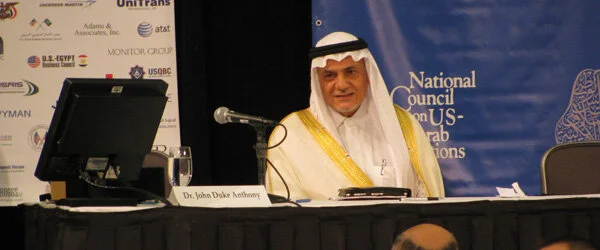Saudi Prince Turki blasts Obama about U.S. pro-Israel Policy
Prince Turki al-Faisal, former chief of Saudi intelligence and former ambassador to the United States, criticized President Obama soundly about his pro-Israeli position in the failed peace talks between Israel and Palestine. Turki is a nephew of the 86-year old King Abdullah and is a powerful figure in Saudi Arabia. Turki spoke on October 22, 2010 at the National Council on U.S.-Arab Relations (NCUSAR) in Washington D.C., an event attended by thousands of policymakers, energy experts, NGO groups and business people.In his keynote speech, Prince Turki, delivered a strong message to the Obama administration about the relationship between Saudi Arabia and the United States, but his most passionate remarks criticized the U.S.-Israel alliance. He stated, “Israel is a drain on the United States and not an asset and foreign policy should follow national interest.”He explained steps that Saudi Arabia has taken toward a two state solution in Palestine. In 2002 Saudi King Abdullah proposed the Arab Peace Initiative (recognition of Israel with pre-1967 borders) which all 22 Arab countries and all 57 Muslim countries have accepted. The United States considers the initiative as a “cornerstone of peace.” He said that the United States has “failed to curb Israel in the brutal policy of collective punishment, arbitrary arrest and killings, illegal colonization, the merciless Israeli bulldozing of Palestinian homes, and the inhuman Israeli practice of uprooting Palestinian olive trees.”He criticized the recent Obama administration proposal to Israeli Prime Minister Benjamin Netanyahu offering security guarantees to Israel in order to coax it to extend the ten month partial freeze on Israeli settlement building – in the West Bank. When the partial freeze expired on September 26, Israel refused to extend it, which derailed the peace talks begun by President Obama.Palestinian authorities have declared that peace talks will continue only if Israel stops construction of settlements in the West Bank.Turki spoke strongly on the issue: “The United States failed to stick to its assurances and, to add insult to injury, offered the Netanyahu government more money, arms, protection from UN sanctions and, shamefully, the stationing of Israeli troops on Palestinian territory; as if this territory were part of the United States’ sovereign lands. All this was to get him [Netanyahu] to extend the partial freeze for a few more days.”Then he added sarcastically, “Now that the Netanyahu government has rejected that offer, we are waiting to see what else the United States will offer.”He also denounced Israel’s occupation of the Golan Heights and the U.S. failure to push Israel to negotiate with Syria for withdrawal. However, his main criticism of the Obama administration is that, although the United States has been “a beacon of goodwill and progress,” U.S. policy protects Israel.“Within the make-up of this administration, there are officials who rationalize, excuse, and condone Israeli intransigence while seeking to put more pressure on the Palestinians to concede even more. These same officials believe that the Palestinian problem is not the root cause of Arab and Muslim antagonism to the United States. It is these officials who propose that the Netanyahu government should be rewarded for its intransigence rather than sanctioned.”He remarked that although the United States has so many experts on the Middle East, he was puzzled by “how your government gets it wrong in our part of the world.” He urged the U.S. to pressure Israel to end its settlements and negotiate with regard to the Arab Peace Initiative. Finally, he asserted that when Israel demands the release of kidnapped Israeli soldier Gilad Shalit from Hamas, it should also be releasing thousands of Palestinians from Israeli prisons.Apart from these diplomatic channels, it is highly likely that Saudi Arabia is using other levers to influence the peace talks. Just two days prior to this speech, on October 20, the State Department and the Pentagon announced plans for the largest arms sale in U.S. history. The U.S. proposes to sell to Saudi Arabia up to 84 F-15 fighter jets, helicopters, bombs, laser guided missiles, machine guns, ammunition and other weapons systems for roughly $60 billion. The deal is expected to pass in Congress because the sale will be a great boon to the American economy and because Saudi Arabia is an ally of the U.S.In a speech to the Carnegie Endowment for International Peace on November 4, Prince Turki again signaled Saudi Arabia’s intent to influence the peace talks. He warned that Saudi Arabia will refuse to “directly or indirectly engage Israel” until it withdraws from all land captured in the 1967 war. He also warned that the victory of the Republican party in the midterm elections will encourage “neoconservatives” and “warmongers” to sabotage the Obama administration efforts to foster the peace talks.Prince Turki’s speeches have been markedly strident and different from his past rhetoric. Undoubtedly, he is signaling a tougher tone from Saudi Arabia to Israel and the U.S. about is disappointment with the derailing of peace talks. It is clear that the Arab world is frustrated with the status of the talks and is determined to play a larger role in the peace process. On October 9th, the Arab League gave the US another month to resurrect negotiations with Israel.Talks appear to be continuing behind the scenes because Senator George Mitchell, the Obama peace envoy, met with Saeb Erekat, chief PLO negotiator, at the State Department on November 4 and Netanyahu is expected to visit with the State Department next week. This photo is courtesy of the author, Ellen Hamilton Baugh.
